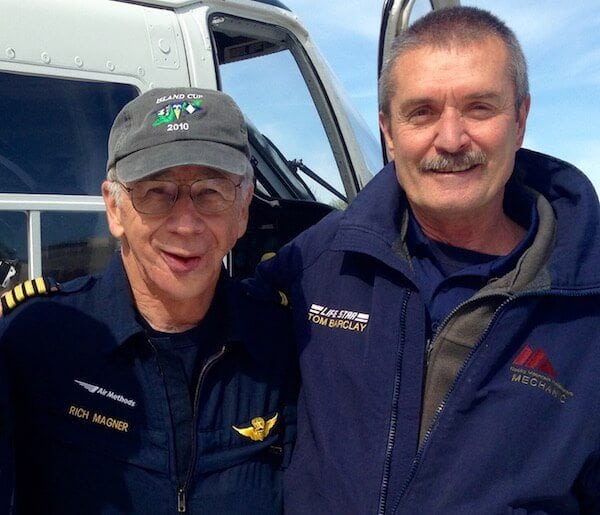By Emily Gravell
Richard Magner, Connecticut’s first LIFE STAR pilot, has traded his helicopter for a sailboat. Magner, 69, of Glastonbury retired in May after 50 years as a pilot and 37 years as an air medical pilot – 31 at the controls of LIFE STAR.
The son of a Harley-Davidson dealer, Magner was born with a sense of adventure. But it wasn’t motorcycles that made his adrenaline surge. Magner wanted to fly. Unbeknown to his parents, he would hitch rides down to the local airport near St. Joseph, Mo., with friends and sit all day, watching planes take off and land.
He moved to California to study mechanical engineering part time, but was drafted and sent to Army basic training at Fort Bliss, Texas. At camp, after seeing a poster recruiting Army aviators, he stepped up and was sent to flight school.
He wound up in Vietnam, but on March 8, 1969, after only four months in the country, the helicopter he was flying was hit by heavy fire and Magner took a bullet to the jaw. It was a medical helicopter that would save his life. He endured more than 20 surgeries and lived with a tracheotomy for 9 years before opting not to have any more surgeries.
In 1974, he married Donna, a nurse he had met during his recovery in Denver. They have three children and now five grandchildren. Donna recently retired after a career as a school nurse in the Glastonbury school system.
Richard’s career as a helicopter pilot took him from Denver to Florida and in 1985 he was recruited to Hartford to help launch the LIFE STAR program.
Literally and figuratively, his career had its high and lows.
He was in the cockpit on the day of the 1998 shooting at the Connecticut Lottery headquarters, the state’s deadliest workplace shooting at that time. Magner recalls seeing the assailant running through the parking lot as he landed the helicopter across the road.
And although he was not the pilot in the 1992 LIFE STAR crash that killed Jennifer Hodges, chief flight nurse and injured pilot Joseph Bremseth and respiratory therapist, Joy Minichello, the emotions of that day will never be a distant memory. But most of Magner’s flights were more routine. About one-third of LIFE STAR’s calls are for trauma patients, often the victims of horrible accidents. The rest are for cardiac, stroke or pediatric patients who must be transported from one hospital ED or ICU to another to ensure the best care.
Magner’s last flight is one he’ll never forget. It wasn’t for a medical emergency, but rather a tribute to an important person in his career. During his time with LIFE STAR, Magner attended meetings with Boston MedFlight and Worcester LifeFlight to help bolster communications between the groups. In March, Dr. Susan Wedel, interim CEO and Medical Director of Boston MedFlight, passed away from cancer. Magner and crew members Nick Mancini and Ethan Kurtzman flew to Hanscom Air Force Base in Massachusetts to cover the Boston MedFlight crew while they attended Wedel’s memorial service.
At the end of the service, Magner, his crew and several other helicopters paid tribute with a flyover. He said it was a clear, beautiful day. Paying a final tribute to his friend and knowing that the flight was probably his last, he admits he got choked up on the way home.
As for what retirement holds, Magner says he’s still trying to wrap his head around it. With a boat in Noank, a condo in Florida and a sixth grandchild on the way, he has a lot to keep him busy. He is also planning a trip back to Vietnam because his first “visit” was cut short. He has some friends who fly, but he says flying is not a priority for him as he has plenty to do on the ground (and, of course, on the water).
LIFE STAR is a critical-care helicopter service that provides air transport for a variety of patients who require care at a tertiary care facility.

